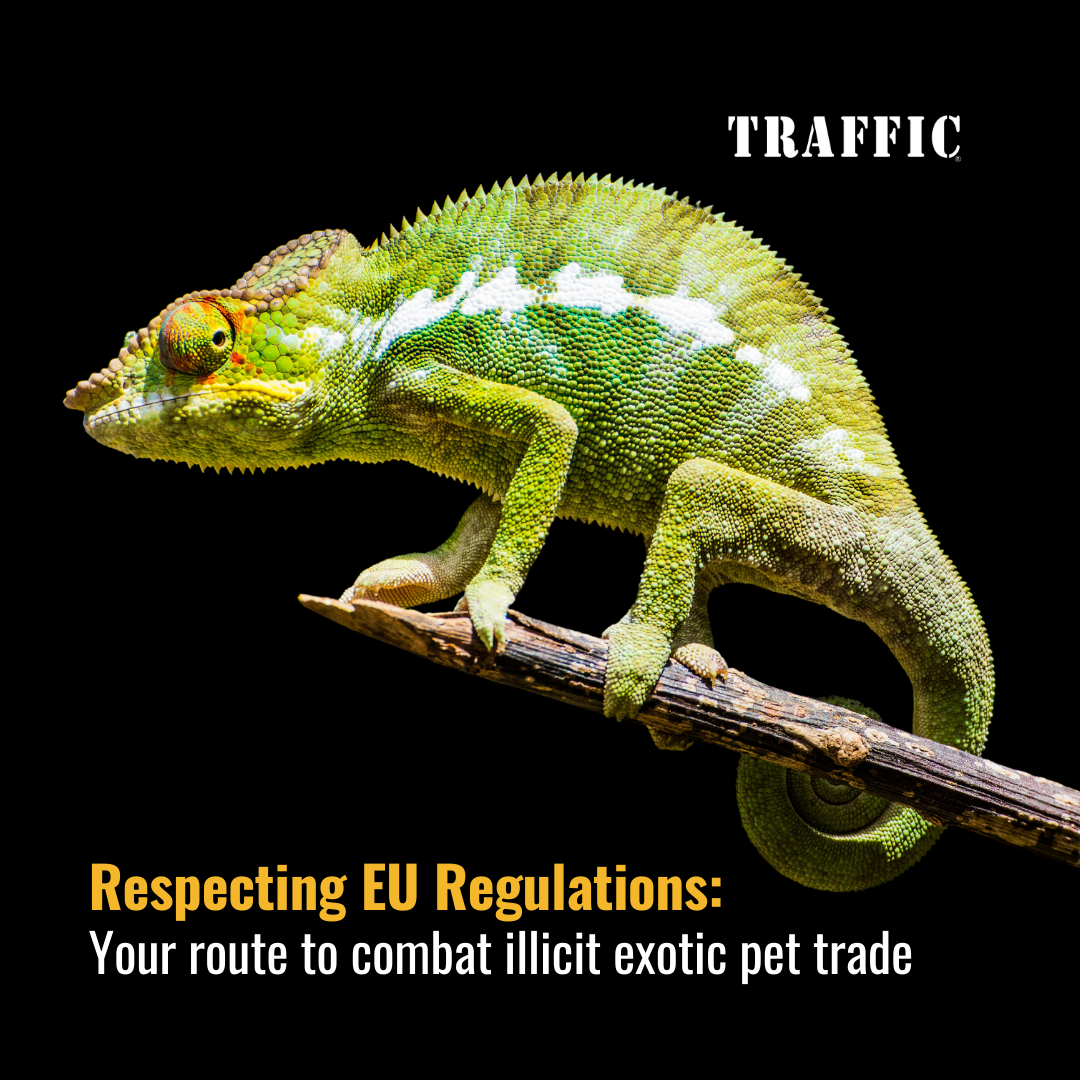Combatting Illegal Exotic Pet Trade: New Campaign Focuses On EU Regulation
There’s a lack of awareness among EU citizens on exotic pet trade and ownership laws in the EU.
The illegal trade in exotic animals poses health risks and is harmful to biodiversity in Europe and the source countries. Wildlife traffickers benefit from a lack of awareness among exotic pet enthusiasts. TRAFFIC and WWF are launching an awareness-raising campaign urging citizens interested in owning an exotic pet to abide by strict EU rules.
The European Union (EU) is a leading market for exotic pets, especially reptiles, amphibians, ornamental birds, and fish. Although many exotic pets are traded legally, the EU is a major target for traffickers looking to profit from illicit trade.
Traffickers exploit loopholes to access consumer markets and smuggle protected species into the EU. They use e-commerce platforms, social media, fairs, and pet shops to target consumers.
There is a general lack of awareness among EU citizens on the laws that apply to exotic pet trade and ownership in the EU. By purchasing illegal pets, they may be unwittingly contributing to wildlife trafficking.
TRAFFIC and WWF campaign
TRAFFIC and WWF have launched a campaign to raise awareness on this issue. “Being aware of the rules is an essential step to avoid contributing to wildlife trafficking. With this campaign, we aim to clarify the issues surrounding the illegal pet trade and urge individuals, if considering a purchase, to make choices aligned with legal and sustainable practices,” said Emilie Van der Henst, Senior Manager Wildlife Trafficking at TRAFFIC.
“If the idea of acquiring an exotic pet has crossed your mind, it's essential to find out, recognise, and follow the rules. It's not just about responsible ownership; it's about making informed choices to safeguard against the conservation, legal, health, and financial risks tied to purchasing exotic pets,” said Stéphane Ringuet, Head of the Wildlife Trade Programme at WWF France.
Exotic pets trafficking in Europe
The illegal trade in wild species generates billions of Euros in illicit funds for wildlife traffickers each year. This contributes to biodiversity decline, negatively impacts human livelihoods, and threatens national security in source countries. The trafficking of wild species for pets also poses global health risks as it evades necessary veterinary checks and could introduce invasive species that could threaten European ecosystems.
Between 2018 and 2021, more than 3,000 live birds, reptiles and amphibians were seized in the EU each year, many of which were destined for the illegal exotic pet trade.
In 2022, TRAFFIC, WWF and IFAW monitored online platforms and social media for a period of several weeks in France, Germany, Italy, The Netherlands, and Spain. A total of 508 CITES Appendix I or II specimens, as well as 34 specimens of non-CITES songbird species, were found. These were shared with law enforcement authorities in the relevant countries for further investigations. Most of these online adverts were connected to the exotic pet trade.
In 2022, EUROPOL, with support from TRAFFIC, WWF and the Spanish Guardia Civil, coordinated a European cyber-patrolling operation to identify exotic pet traffickers online. Sixty-one individuals and companies were further investigated, leading to at least 84 wildlife seizures and, so far, two arrests. 20 EU Member States participated in this operation together with 6 Latin American countries to tackle this crime jointly.
ENDS
About the UNITE project
The UNITE project unites efforts between law enforcement authorities, NGOs, EU and international agencies, and the financial and private sectors to defeat environmental crime. It aims to defeat criminal networks involved in waste or endangered species trafficking, including illegal trade in timber, in and via the EU, and to recover the assets generated from these illegal activities.
The project is funded by the European Commission's Directorate General for Home Affairs via the Internal Security Fund – Police. It is led and implemented by the French Gendarmerie (OCLAESP), the Italian Carabinieri, the Guardia Civil (SEPRONA), the Hungarian and Slovak police forces and the NGOs IFAW, WWF Hungary, WWF France, WWF Belgium and TRAFFIC's in-kind support.
Disclaimer
The campaign has been funded by the European Union’s Internal Security Fund — Police. The content of this press release represents the views of the authors only and is his/her sole responsibility. The European Commission does not accept any responsibility for use that may be made of the information it contains.
Press release distributed by Pressat on behalf of TRAFFIC, on Wednesday 8 November, 2023. For more information subscribe and follow https://pressat.co.uk/
Pets Exotic Pets Pet Trade Wildlife Trade EU European Union Laws Regulations Biodiversity Animals Fish Reptiles Birds Parrots Environment & Nature Farming & Animals Home & Garden Lifestyle & Relationships
You just read:
Combatting Illegal Exotic Pet Trade: New Campaign Focuses On EU Regulation
News from this source:



